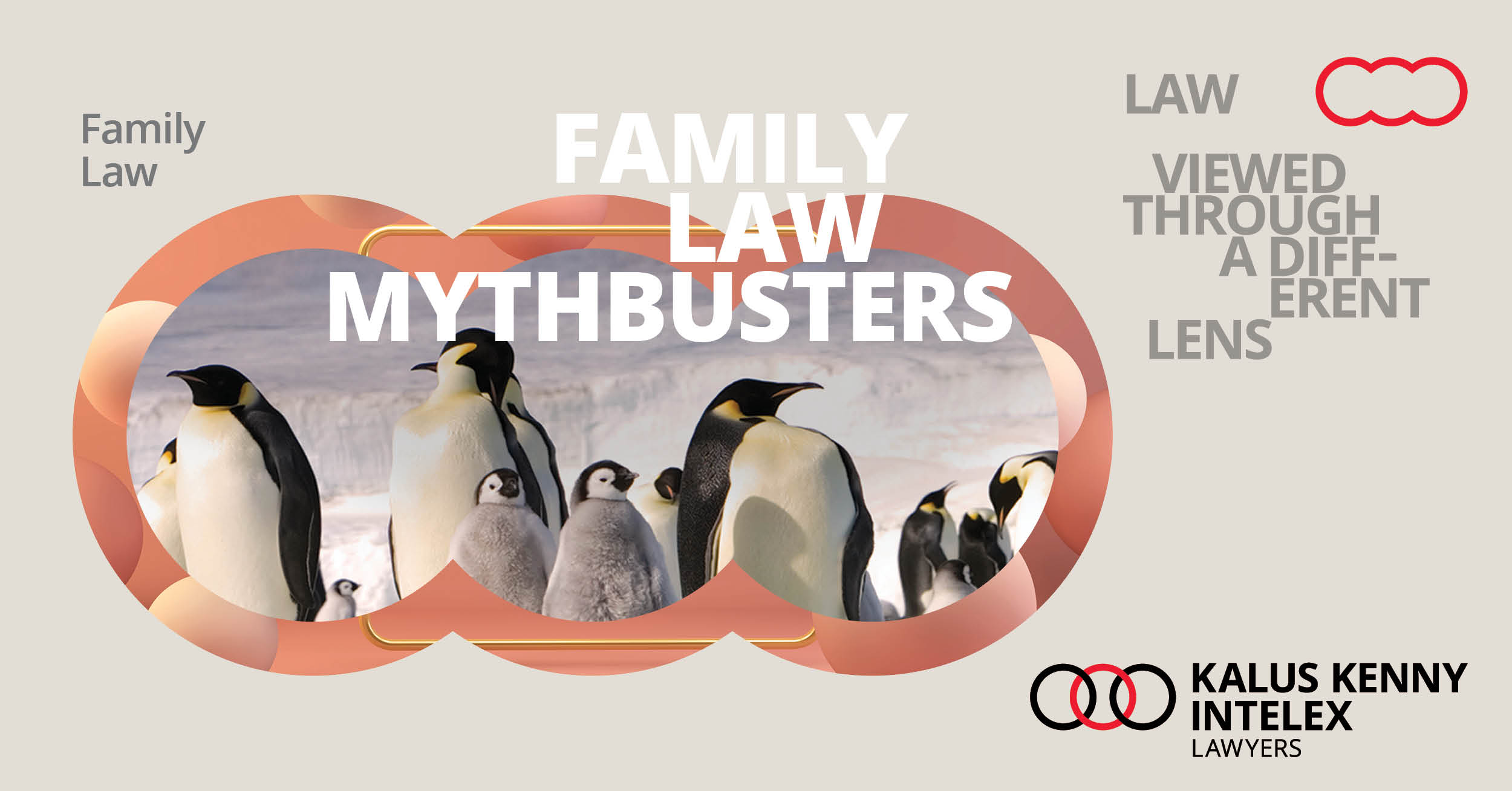When it comes to family law issues, it seems that almost everyone has a personal anecdote or piece of advice to share. While given with good intentions, this information can often lead to misconceptions about family law generally, a person’s entitlements, the costs and the process.
Time and time again, family lawyers are asked to clarify misconceptions which may have come from others with past experience, non-family law professionals, or even the latest legal television series.
Attempting to negotiate or proceed through the separation process on the basis of these misconceptions can lead to unfair or inappropriate outcomes, or result in steps being taken early which may be detrimental to achieving the ultimate goal.
To avoid this, and assist parties and professional advisers involved at the start of the separation process get on the right track, this article clarifies some of the most common of these misconceptions.
Can I “legally separate”
There is no process to “legally separate” from a partner in Australia, and it does not necessarily require one party to move out of a shared home. There are sometimes circumstances where parties remain living separately under the one roof.
The criteria required to determine when parties separate is that one party communicates their intention to separate to the other, and then acts on that intention. Sometimes disputes can arise about the date of separation, and parties can have very different views about it. It is therefore important to note the details in case of a dispute later.
“Getting a divorce” means finalising property and parenting matters
A divorce does not deal with property settlement or parenting issues. A divorce is a standalone application to the court to legally terminate a marriage. Other than in exceptional circumstances, parties can only apply for a divorce after being separated for 12 months.
Dealing with parenting and property matters are very separate processes, and do not necessarily require an application to the court. These issues can be dealt with at any time either prior to or after a divorce – although an application to the court in relation to financial matters must be made within 12 months from the date a divorce is granted.
A new partner can make a property claim
De facto couples have almost identical property rights to married couples under Australian family law legislation. However, this is not automatic and there is certain criteria which must be met before a de facto partner is able to apply for property settlement, including:
- Firstly, the parties must be in a de facto relationship, as defined in the Family Law Act 1975, being that “they have a relationship as a couple living together on a genuine domestic basis.” The assessment of the existence of a de facto relationship involves taking into account a myriad of factors about the relationship;
- The parties must have been in a de facto relationship (not simply dating) for a period of at least 2 years; OR
- If there is a child of the de facto relationship; OR
- One of the parties to the de facto relationship has made substantial contributions and denying a claim would result in serious injustice to that party;
- The relevant geographical requirements are satisfied.
Property settlements are automatically “50/50” or “Whoever has the kids will get more”
There is no pre-determined percentage division of assets in property settlements.
Each situation is different and is determined according to numerous factors set out in the Family Law Act 1975, primarily being:
- the asset pool to be divided, including the value and nature of the assets involved;
- the financial and non-financial contributions (including as homemaker and parent) made by each of the parties;
- the length of the marriage, the ages and arrangements for any children, the age, state of health and income earning capacity of each party, among other things.
Assets held before a relationship or inheritances are excluded from any claim
All assets held at the time that an agreement is reached or a court determines a property settlement are included in the asset pool available for division. This can be even if this occurs many years after separation.
If one party held assets before the relationship or received an inheritance, these assets will be included in the asset pool, and considered as a contribution by that party, potentially resulting them receiving a greater percentage, depending on the value of what was brought in/inherited and the length of time passed since.
Assets held in a company or trust are protected from a property settlement claim
Assets held in a company or trust are not protected from a property settlement claim. If a party has control of a company or trust, and holds an interest as a shareholder or beneficiary, then those assets will be included as part of the asset pool in a property settlement.
Where third parties are involved, this becomes a little more complicated and structure and roles in the company/trust will need to be closely looked at to determine where these assets fit into a property settlement. It may be that the assets held by a company/trust will be considered as a “financial resource” to one of the parties, which will still impact the manner in which the assets are divided.
A party will be financially penalised because of bad behaviour during a relationship
Australia has a no-fault family law system. Immoral or inappropriate behaviour during (or after) separation will be irrelevant when property settlement matters are determined.
There are only exceptional circumstances where such behaviour may be relevant, including where one party has been financially reckless or wasteful (involving more than just excessive lifestyle expenditure), or where there has been family violence to the extent that one party has suffered so much as a result, that it significantly impacted their ability to contribute to the marriage. This is a very high threshold and not easily met.
“Pre-nups” are worthless
“Pre-nups” or financial agreements, as they are referred to in Australia, are a very important tool in assisting parties to pre-determine the division of their assets in the event of separation. This is particularly so in second and later relationships where parties have accumulated their own wealth and often have children to previous relationships.
There are very strict requirements for a financial agreement to be valid and binding, and when prepared by an experienced family lawyer in accordance with those requirements, are often upheld when challenged.
The financial agreements which are ultimately set aside by a court are often prepared by lawyers not experienced in family law, where the strict requirements have not been complied with, or where there are indications of duress or unconscionable conduct at the time the agreement is prepared and signed.
Children can decide where they want to live when they are 14
There is no fixed age at which a child is able to decide where they want to live, and whether or not they want to see one parent or the other.
The court is able to make orders about the arrangements it considers are in a child’s best interests until they are 18, taking into account all the circumstances.
A child’s view is one of the factors to be taken into account, and given weight according to the child’s maturity and level of understanding, balanced with the other relevant factors.
A child’s views are generally conveyed to the court by an independent expert such as a family consultant or independent children’s lawyer, if appropriate. Children are not directly involved in court proceedings and cannot give evidence.
Practically speaking, however, the court recognises older children are less likely to cooperate with orders they do not want, and takes this into account when making decisions.
Getting a lawyer means going to court
Lawyers have a professional obligation to exhaust all opportunities for resolution before issuing a court application.
While the preferred situation is to be able to resolve disputes without court, there may be reasons where a court application is the most cost-effective and efficient option to deal with either urgent issues or non-cooperation by the other party in trying to negotiate a resolution.
Engaging in a process where court is not an available option can sometimes result in a situation where the less empowered or informed person is disadvantaged.




